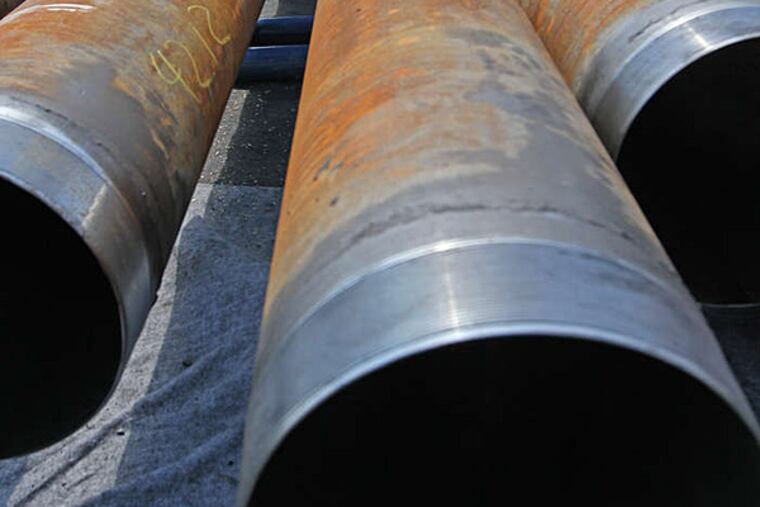Marcellus Shale pipeline to Phila. pondered
A group of Philadelphia business and political leaders wants to develop an ambitious Marcellus Shale natural gas pipeline to the city to fuel the growth of energy-intensive industries.

A group of Philadelphia business and political leaders wants to develop an ambitious Marcellus Shale natural gas pipeline to the city to fuel the growth of energy-intensive industries.
The informal group is in the early stages of exploring a project that would connect Pennsylvania's booming natural gas fields directly to Philadelphia.
The project would involve uniting a consortium of big industrial buyers with Marcellus gas producers to agree to long-term commitments that would guarantee financing for the pipeline's construction.
It would face enormous political and regulatory challenges, including threading a pipeline of more than 3 feet in diameter through Philadelphia's densely populated suburbs.
One route under discussion would avoid populated areas by burying the pipeline in the bed of the Delaware River, connecting underused waterfront properties to an energy superhighway.
Philip L. Rinaldi, chief executive of Philadelphia Energy Solutions, the former Sunoco refinery in South Philadelphia, identified himself last week as the chairman of the group, which would work under the umbrella of the Greater Philadelphia Chamber of Commerce.
Rinaldi was working the sidelines at the Shale Insight conference in Philadelphia last week, where natural gas industry leaders gathered.
He said the current pipeline infrastructure was insufficient to supply "transformative" new industries that could energize a manufacturing revival in the city.
"We're trying to work on how to get that gas here to valorize it," he said. "Eventually, the Marcellus Shale gas will be a great friend, but not until it gets here."
Rinaldi said the group includes the leaders of Sunoco Logistics L.P., the Philadelphia pipeline company that operates large fuel terminals on the Delaware River, and Braskem America, the subsidiary of a Brazilian industrial firm that bought Sunoco's chemical unit in 2010.
Also included in discussions are Rob Wonderling, the chamber president; Tom Morr, the chief executive of Select Greater Philadelphia; William R. Sasso, a Philadelphia lawyer and confidant of Gov. Corbett; Rep. Pat Meehan, (R., Pa.), whose district includes the industrial Delaware County waterfront; and Michael Krancer, Corbett's former environmental secretary.
The effort to develop a pipeline fit snugly with a theme at the Shale Insight conference - how to tap into the enormous output of gas and liquid fuels that have been unlocked by hydraulic fracturing and horizontal drilling.
The frustration for industrial leaders is that the region's pipeline infrastructure contains only enough capacity to deliver a marginal increase in gas to the city.
With low gas prices projected, the economics of building a pipeline, however, would require it to carry a colossal quantity of gas, more than any one industrial user would need.
"You'd need to have a lot of off-takers," Rinaldi said. "That's the kind of dilemma we're trying to solve."
Rinaldi has notions to expand production at Philadelphia Energy Solutions' 1,500-acre refinery site in South Philadelphia. Since acquiring the plant last year, the company has refurbished a residual catalytic cracker, a unit that turns heavy oil into diesel.
The company also is exploring plans to build a gas-fired co-generation plant to produce steam and electricity for the refinery, and possibly production units to manufacture derivatives of natural gas, such as urea ammonium nitrate fertilizer.
Those projects would require more gas than can now be delivered, but less than would support construction of a dedicated Marcellus pipeline.
The challenge in building a big pipeline to the city lies in the last 20 miles.
"It's probably not a problem getting within 15 to 20 miles of Philadelphia, where it's reasonably cost-effective to lay a big pipeline," Rinaldi said. The pipeline might follow existing rights of way along the turnpike or defunct rail lines.
One possible avenue into the city would be to avoid the suburbs and route the pipeline down the Delaware River, burying the conduit in the riverbed, bypassing the densely populated areas.
An advantage of such a route is that it runs next to a host of riverfront industrial sites, including refineries and chemical manufacturers.
A river route would require approval from the U.S. Army Corps of Engineers. And it would no doubt arouse fierce opposition from environmental activists.